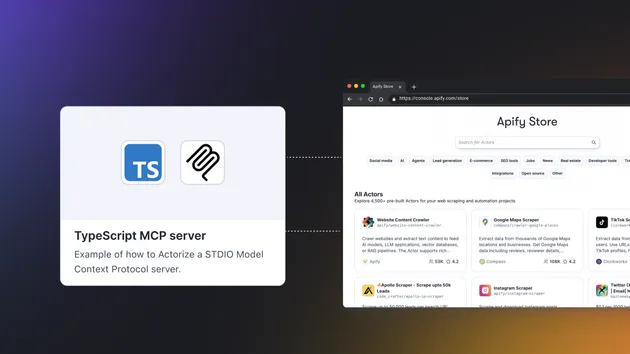uuid generator actor mcp
Pricing
$0.02 / 1,000 results
uuid generator actor mcp
Generates universally unique identifiers (UUIDs) efficiently for use in applications, workflows, and data pipelines. Supports multiple UUID versions and customizable output formats. Ideal for tasks requiring unique reference values, entity tagging, or session management.
Pricing
$0.02 / 1,000 results
Rating
0.0
(0)
Developer

Yash Kavaiya
Actor stats
0
Bookmarked
3
Total users
2
Monthly active users
4 months ago
Last modified
Categories
Share
UUID Generator Actor with MCP Server
A comprehensive UUID toolkit for the Apify platform with Model Context Protocol (MCP) server integration. Generate, validate, analyze, and manage universally unique identifiers (UUIDs) with support for multiple UUID versions and advanced operations.
Features
Core Operations
- Generate - Create UUIDs in bulk with multiple version support
- Validate - Check if a UUID is valid and identify its version
- Analyze - Extract detailed information from UUIDs (version, variant, timestamp, format)
- Convert - Transform UUIDs between different formats
- Batch Validate - Validate multiple UUIDs at once
- Batch Analyze - Analyze multiple UUIDs with statistics
- Check Collisions - Find duplicate UUIDs in collections
- Statistics - Generate comprehensive UUID statistics
UUID Version Support
- Version 1 (v1): Timestamp-based UUIDs with MAC address
- Version 4 (v4): Random UUIDs (most common)
- Version 5 (v5): Namespace-based UUIDs using SHA-1
Output Formats
- JSON: Structured data with full metadata support
- CSV: Comma-separated values for database imports
- Plain Text: One UUID per line for simple integration
MCP Server Integration
Built-in Model Context Protocol server for AI agent integration. Allows AI assistants (like Claude, GPT, etc.) to directly access UUID operations as tools.
Quick Start
As an Apify Actor
As an MCP Server
Configure in your MCP settings:
Operations
1. Generate UUIDs
Create UUIDs in bulk with specified version and formatting options.
Input:
Output:
2. Validate UUID
Check if a UUID is valid and get its version.
Input:
Output:
3. Analyze UUID
Extract detailed information including version, variant, format, and timestamp (for v1).
Input:
Output:
4. Convert Format
Transform UUIDs between different formats (standard/compact, upper/lowercase).
Input:
Output:
5. Batch Validate
Validate multiple UUIDs at once.
Input:
Output:
6. Batch Analyze
Analyze multiple UUIDs with version breakdown.
Input:
Output:
7. Check Collisions
Find duplicate UUIDs in a collection.
Input:
Output:
8. Generate Statistics
Get comprehensive statistics about UUID collections.
Input:
Output:
MCP Server Tools
When running as an MCP server, the following tools are available to AI agents:
generate_uuid- Generate UUIDs with version and format optionsvalidate_uuid- Validate a single UUIDanalyze_uuid- Analyze UUID and extract detailsconvert_uuid_format- Convert UUID formatbatch_validate- Validate multiple UUIDsbatch_analyze- Analyze multiple UUIDscheck_collisions- Find duplicatesgenerate_statistics- Generate UUID statistics
MCP Server Usage
Start the MCP server:
Or install globally and run:
Configuration
Input Schema
| Field | Type | Default | Description |
|---|---|---|---|
operation | String | generate | Operation to perform |
uuidVersion | String | v4 | UUID version (v1, v4, v5) |
count | Integer | 10 | Number of UUIDs to generate (1-100,000) |
namespace | String | DNS | Namespace for v5 (DNS, URL, OID, X500, or custom) |
name | String | - | Name for v5 hashing (required for v5) |
uuid | String | - | Single UUID for validate/analyze/convert |
uuids | Array | - | Multiple UUIDs for batch operations |
outputFormat | String | json | Output format (json, csv, text) |
includeMetadata | Boolean | true | Include metadata in JSON output |
uppercase | Boolean | false | Output in uppercase |
removeDashes | Boolean | false | Remove dashes (compact format) |
Predefined Namespaces (UUID v5)
DNS- For domain names (6ba7b810-9dad-11d1-80b4-00c04fd430c8)URL- For URLs (6ba7b811-9dad-11d1-80b4-00c04fd430c8)OID- For ISO OIDs (6ba7b812-9dad-11d1-80b4-00c04fd430c8)X500- For X.500 DNs (6ba7b814-9dad-11d1-80b4-00c04fd430c8)
Use Cases
Software Development
- Generate unique IDs for database records
- Create session tokens
- Generate unique filenames
- API key generation
Testing & QA
- Generate test data with unique identifiers
- Validate UUID fields in APIs
- Test UUID collision resistance
- Performance testing with bulk UUID generation
Data Management
- Database record identification
- Distributed system node IDs
- File versioning systems
- Message queue identifiers
Analysis & Auditing
- Validate UUID compliance in datasets
- Analyze UUID version distribution
- Detect duplicate identifiers
- Generate UUID usage reports
API Integration
Using Apify Client
Using Apify SDK
Performance
- Generation: Up to 100,000 UUIDs per run
- Validation: Handles large batches efficiently
- Memory: Optimized for minimal memory footprint
- Progress Logging: Real-time updates for batches > 1,000 items
Best Practices
- Use UUID v4 for general purposes - Random UUIDs are suitable for most use cases
- Use UUID v5 for deterministic generation - When you need the same input to produce the same UUID
- Use UUID v1 for sortable identifiers - When time-ordering is important
- Batch operations for efficiency - Process multiple UUIDs in a single run
- Choose appropriate output format:
- JSON for metadata and structured data
- CSV for database imports
- Text for simple scripts and piping
RFC 4122 Compliance
This Actor follows RFC 4122 standards:
- Correct version bits in all generated UUIDs
- Proper variant field encoding
- Standard formatting (8-4-4-4-12 hex digits)
- Cryptographically secure random generation for v4
Error Handling
The Actor includes comprehensive error handling:
- Input validation with clear error messages
- UUID format validation
- Version-specific requirement checks
- Graceful handling of invalid inputs
Installation
Local Installation
Running Locally
Examples
See the .actor/input_examples/ directory for complete example configurations for all operations.
Support & Contribution
- Report Issues: GitHub Issues
- Contribute: Pull requests welcome
- Documentation: Full API Documentation
License
Apache-2.0
Keywords
uuid, guid, identifier, generator, apify, actor, mcp, model-context-protocol, validation, analysis, batch-operations, unique-id, v1, v4, v5, random, timestamp, namespace, collision-detection
Production Ready - This Actor follows Apify best practices and is designed for reliability, scalability, and easy integration with your existing workflows and AI agents.




